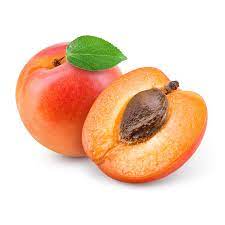 An apricot is usually from the species P. armeniaca.
An apricot is usually from the species P. armeniaca.
The fruits of the other species in Prunus sect. Armeniaca are also called apricots.
It is grouped with plum species according to DNA sequences, but is more closely related to apricot species.
Prunus armeniaca, the common apricot, is cultivated for its edible fruit and kernel
The apricot is a small tree, 8–12 m. tall.
Its trunk is up to 40 cm (16 in) in diameter and a dense, spreading canopy.
The leaves are ovate, 5–9 cm long, and 4–8 cm wide, with a rounded base, a pointed tip, and a finely serrated margin.
The fruit is a drupe, stonefruit, similar to a small peach, 0.6–1.0 in diameter from yellow to orange, often tinged red on the side most exposed to the sun.
The apricot surface can be smooth or velvety with very short hairs.
Its taste can range from sweet to tart.
It has a single seed in a hard shell, often called a “stone”, with a grainy, smooth texture except for three ridges running down one side.
Apricots have a chilling requirement of 300 to 900 chilling units.
Apricot cultivars are usually grafted onto plum or peach rootstocks.
The cultivar scion provides the fruit characteristics, such as flavor and size, but the rootstock provides the growth characteristics of the plant.
Hybridisors have created the cherry plum, plumcots, apriplums, pluots, or apriums.
Apricots, dried
Nutritional value per 100 g (3.5 oz)
Energy
1,009 kJ (241 kcal)
Carbohydrates
63 g
Sugars
53 g
Dietary fiber
7 g
Fat
0.5 g
Protein
3.4 g
Vitamins
Quantity %DV
Vitamin A equiv.
23% 180 μg
beta-Carotene
20%2163 μg
Thiamine (B1)
1% 0.015 mg
Riboflavin (B2)
6% 0.074 mg
Niacin (B3)
17% 2.589 mg
Pantothenic acid (B5)
10% 0.516 mg
Vitamin B6
11% 0.143 mg
Folate (B9)
3% 10 μg
Vitamin C
1% 1 mg
Vitamin E
29% 4.33 mg
Vitamin K
3% 3.1 μg
Minerals
Quantity %DV
Calcium
6% 55 mg
Iron
20% 2.66 mg
Magnesium
9% 32 mg
Manganese
11% 0.235 mg
Phosphorus
10% 71 mg
Potassium
25% 1162 mg
Sodium
1% 10 mg
Zinc
3% 0.29 mg
Apricots, raw
Nutritional value per 100 g (3.5 oz)
Energy
201 kJ (48 kcal)
Carbohydrates
11 g
Sugars
9 g
Dietary fiber
2 g
Fat
0.4 g
Protein
1.4 g
Vitamins
Quantity %DV
Vitamin A equiv.
12% 96 μg
beta-Carotene
10%1094 μg
lutein zeaxanthin
89 μg
Thiamine (B1)
3% 0.03 mg
Riboflavin (B2)
3% 0.04 mg
Niacin (B3)
4% 0.6 mg
Pantothenic acid (B5)
5% 0.24 mg
Vitamin B6
4% 0.054 mg
Folate (B9)
2% 9 μg
Vitamin C
12% 10 mg
Vitamin E
6% 0.89 mg
Vitamin K
3% 3.3 μg
Minerals
Quantity %DV†
Calcium
1% 13 mg
Iron
3% 0.4 mg
Magnesium
3% 10 mg
Manganese
4% 0.077 mg
Phosphorus
3% 23 mg
Potassium
6% 259 mg
Sodium
0% 1 mg
Zinc
2% 0.2 mg
Quantity
Water
86 g
In a 100-gram amount, raw apricots supply 48 Calories and are composed of 11% carbohydrates, 1% protein, less than 1% fat, and 86% water.
Raw apricots are a moderate source of vitamin A and vitamin C : 12% of the daily value each.
When apricots are dried, the relative concentration of nutrients is increased, with vitamin A, vitamin E, potassium, and iron having daily values above 25%.
Apricots contain phytochemicals: provitamin A beta-carotene and polyphenols, including catechins and chlorogenic acid.
Apricots contain taste and aroma compounds: sucrose, glucose, organic acids, terpenes, aldehydes and lactones.
Apricot kernels (seeds) contain amygdalin, a poisonous compound.
Apricot kernels contain about 5% amygdalin and sweet kernels about 0.9% amygdalin, corresponding to 0.3% and 0.05% of cyanide.
